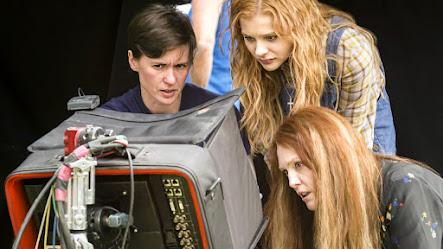FREEDOM OF EXPRESSION IN THE VIRTUAL WORLD
To what extent are social media platforms responsible for regulating content?
By Ian Dotson
In my lifetime, I've seen the modes and manners in which we communicate evolve many times. The advent of the internet gave us access to endless information at our fingertips. Email became a brand new way to engage in discourse and receive quick responses from those with whom we chose to communicate. As technology progressed, applications like AOL Instant Messenger gave us even more instant connection to others. We've seen sites like Xanga and Myspace come and go in favor of new social media iterations like Facebook and Instagram. In 2023, advances in technology have brought consumer virtual reality headsets into the fold providing unprecedented means of social expression in an ever-growing and evolving mass forum. Users of platforms like VR Chat have the ability to customize their in-game avatar (in this context, Oxford Dictionary defines "avatar" as an icon or figure representing a particular person in video games, internet forums, etc.) to be whatever or whomever they please. This could mean conversing with a sentient banana or playing ping-pong with President Obama. The options and the ability to customize your character is almost infinite. This goes beyond just appearance. There are external applications such as VoiceMod that allow users to "choose from more than 70 different voices and create unique characters for your virtual worlds." Some of the voice modulation options include: Scary Voice, Girl Voice, Robot Voice, Scream Voice, etcetera. Essentially, on VR Chat, you can be anyone. While this offers nearly endless freedom of expression, the anonymity and the freedom to essentially be whomever has given rise to some unsavory behavior on part of certain users.
As with any new technological advancement, it presents a "double-edged sword" in its potential applications. Although it allows unprecedented freedom of expression, the limit on restrictions by VR Chat itself has given some users an outlet to engage in hate speech, bullying and sexual harassment on the platform. In 2022, The Center for Countering Digital Hate did a case study that estimated that VR Chat users, some of them minors, were exposed to abusive behavior roughly "every seven minutes." Examples given included "minors being exposed to graphic sexual content… minors being groomed to repeat racial slurs and extremist talking points," as well as "threats of violence and content mocking 9/11 terrorist attacks." One New York Times reporter even described another user simulating "ejaculating on her" in similar open-forum virtual reality game. The UK-based National Society for the Prevention of Cruelty to Children also conducted a study in which a reporter, posing as a 13 year old child, witnessed sexually explicit material, grooming, racist insults and at least one rape threat in her short time on the platform. This has led many to see virtual reality in its current state as a kind of virtual "Wild West" where they need not assume responsibility for their words and actions.
The big question this poses is: "should there be some kind of regulation of speech and expression when it comes to burgeoning technologies like virtual reality?" In the interest of society, should there be more (or any) regulation on free speech in this new context. We have seen platforms like Twitter and Facebook "block" or "delete" posts or accounts associated with hate speech, racism, sexual harassment, etc. The users in question sometimes lose the privelege of posting on these public forums, but often face no other repercussions for their actions. In the United States Our First Amendment rights protect us, for the most part, from persecution for expressing our views. Though in the early colonial United States, you could be arrested for simply sharing anti-government sentiments, restructuring of laws and the establishment of federal and state courts have led to most rulings leaning in favor of protecting free speech over regulation of it. In a 1969 case, Brandenburg V. Ohio, the Supreme Court ruled that speech, even if it advocates illegal conduct, is protected under the First Amendment. Essentially most speech, be it explicit, vulgar, in support of terrorism, etcetera is protected in the US unless it is deemed by the courts to be speech "likely to incite imminent danger." Private companies such as Twitter, Instagram and Facebook have the freedom to regulate user content on the basis of ever-changing personal and often individual views held by the companies themselves. Expectations of "appropriate user behavior" are generally subjective and decided by these private companies rather than by some grand overseer at the federal or state level. This is why we sometimes see Facebook posts with "radical" or "false" ideas get "flagged" or "blocked" in the interest of meeting a social agenda or ideal purported by the platform in question. Though these regulations are at the discretion of whomever polices these sites, there are at least some ways to hold people accountable for their views and actions. If virtual reality as a mode of communication continues to flourish the way it has in recent years, we can likely expect to see more accountability and regulation on the part of software developers. In fact, VR Chat's developers recently addressed the recent outrage with an open letter on the platform itself: "We're aware there's a percentage of users that choose to engage in disrespectful or harmful behavior. It is our top priority to address the quality of the VR Chat experience, especially for new users, and our team will continue to work toward improving that." Regardless, in its current state, platforms like VR Chat enable users to lie about their ages in order to gain access to the platform and it also enables users to speak and behave however they please to whomever they please anonymously and with zero accountability or consequence. And as far as the law is concerned, they are all within their rights as Americans.
It is important to remember above anything, that technology is not inherently good or evil. It is simply a tool. How these tools are used is a reflection of the individual and not the tool itself. It is however important to acknowledge that the creators of such tools should also be held responsible if safety measures are not put in place before the tool's distribution to the public. If you bought a table saw with a blade that shot off into the air upon use, it would be the manufacturer, not the user who should be held accountable for the results.
Sources:
https://www.bbc.com/news/technology-60415317
https://counterhate.com/blog/star-framework-safety-by-design/
https://oed.com
https://www.nytimes.com/2021/12/30/technology/metaverse-harassment-assaults.html
https://uploadvr.com/vrchat-dev-vows-address-harmful-users-open-letter/
https://www.voicemod.net/vrchat-voice-changer/



Comments
Post a Comment